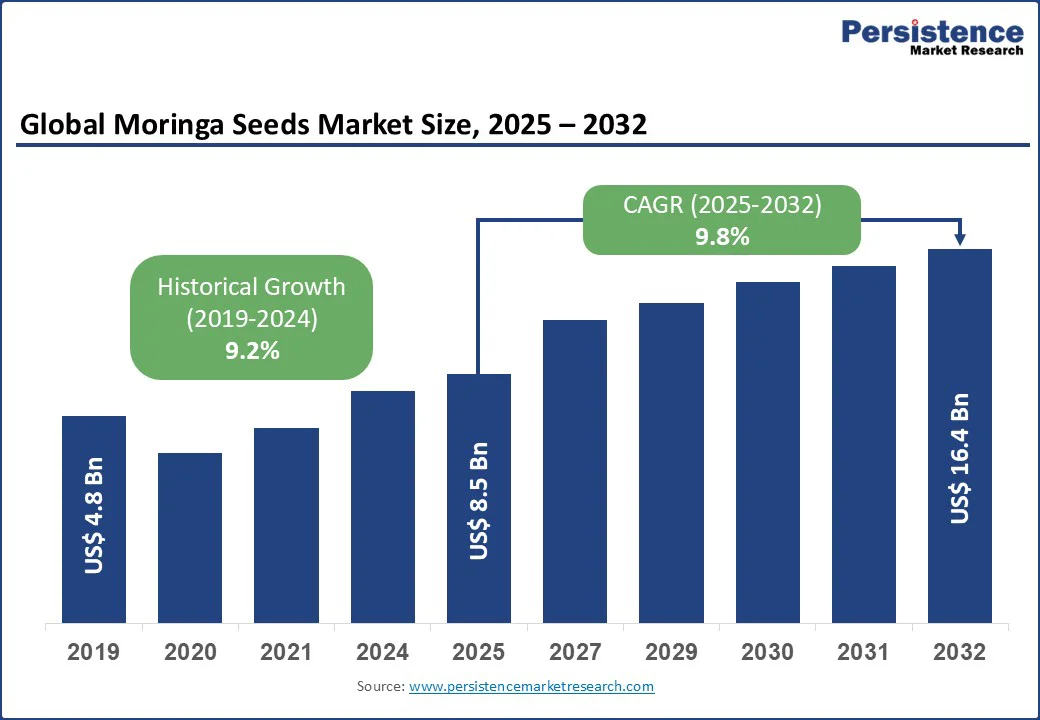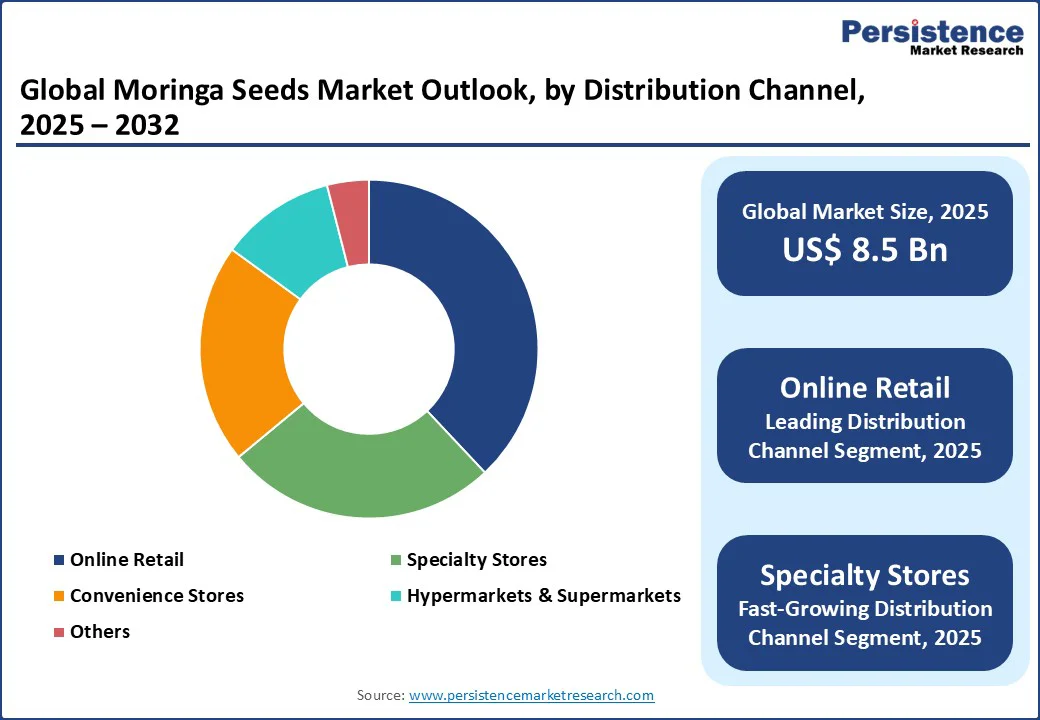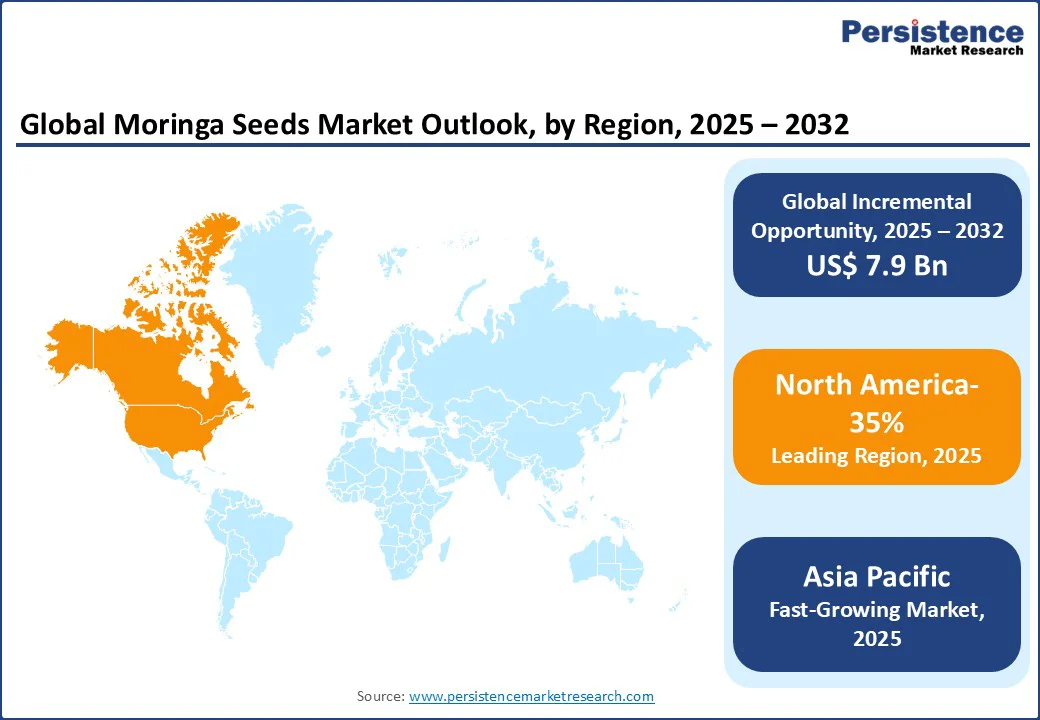ID: PMRREP32963| 189 Pages | 4 Sep 2025 | Format: PDF, Excel, PPT* | Food and Beverages

The global moringa seeds market size is likely to be valued at US$8.5 Bn in 2025 and is estimated to reach US$16.4 Bn by 2032, growing at a CAGR of 9.8% during the forecast period from 2025 to 2032.
The growth is driven by rising consumer awareness of moringa’s nutritional and medicinal benefits, increasing demand for natural and organic products, and expanding applications in dietary supplements, pharmaceuticals, and cosmetics.
The surge in health-conscious lifestyles, particularly in North America and Europe, coupled with growing moringa cultivation in the Asia Pacific and Africa, fuels market expansion. Additionally, the shift toward sustainable, plant-based solutions and the rise of e-commerce platforms are creating significant opportunities for moringa-based products globally.
Key Industry Highlights

|
Global Market Attribute |
Key Insights |
|
Moringa Seeds Market Size (2025E) |
US$8.5 Bn |
|
Market Value Forecast (2032F) |
US$16.4 Bn |
|
Projected Growth (CAGR 2025 to 2032) |
9.8% |
|
Historical Market Growth (CAGR 2019 to 2024) |
9.2% |
The moringa seeds market is witnessing strong growth driven by rising health awareness and consumer preference for natural products. With moringa recognized globally as a superfood, demand is increasing for its seed extracts, oils, and powders rich in antioxidants, vitamins, proteins, and essential minerals.
As individuals shift toward plant-based nutrition and organic supplements, moringa seeds are gaining traction as a sustainable, nutrient-rich solution. This trend aligns with the global wellness movement, where consumers seek clean-label, chemical-free products to support preventive healthcare and holistic well-being.
Government programs further reinforce this growth by promoting the health benefits of moringa and encouraging its cultivation. For instance, India’s Health Department has initiated the plantation of moringa trees in community health centres and government hospitals in Varanasi, highlighting their role in combating malnutrition among children and women. Such initiatives not only boost awareness of moringa health benefits but also create demand for moringa seed-based products, strengthening seeds market as a trusted source of natural, functional nutrition.
Despite its growing recognition as a superfood, the moringa seeds market faces a key restraint in the form of limited consumer awareness. Many potential buyers in emerging and developed regions remain unfamiliar with the nutritional and medicinal benefits of moringa seeds compared to other well-known natural products.
This knowledge gap slows adoption, particularly in markets where consumer education and promotional efforts are lacking. As a result, moringa seeds often compete unfavorably with more widely marketed plant-based supplements and organic products.
Another critical challenge is the high production cost associated with moringa seed cultivation, processing, and extraction. Maintaining quality standards, ensuring organic certification, and implementing sustainable farming practices all require substantial investment.
Additionally, moringa seed oil and derivatives demand advanced processing technologies, which add to overall costs. These factors make moringa seed-based products relatively expensive compared to conventional alternatives, restricting their accessibility to price-sensitive consumers and limiting the pace of market expansion, especially in developing economies.
The rising demand for natural and plant-based ingredients in the cosmetics and personal care industry is opening lucrative opportunities for the moringa seeds market. Moringa seed oil, known for its antioxidant, moisturizing, and anti-aging properties, is increasingly being used in skincare, haircare, and body care formulations.
With consumers shifting toward clean beauty and organic cosmetics, global brands are incorporating moringa extracts into their product lines. This growing adoption positions moringa seeds as a sustainable, functional ingredient in the premium cosmetics segment.
In addition to cosmetics, emerging markets across Asia, Africa, and Latin America are offering untapped growth potential for moringa seeds. Rising disposable incomes, increasing health awareness, and government support for herbal products are driving demand in these regions. Local manufacturers and startups are also capitalizing on moringa’s superfood image to launch affordable supplements and beauty products. As consumer preferences in these markets shift toward natural wellness and beauty.
In 2025, moringa seeds and oil dominated with a 45% share, supported by their broad applications in dietary supplements, cosmetics, and pharmaceuticals. Among these, moringa seed oil has emerged as a star ingredient in the global beauty industry, valued for its lightweight texture, quick absorption, and nutrient-rich profile. Sales of moringa oil recorded an 18% rise in 2024 as leading skincare and haircare brands incorporated it into premium formulations, highlighting its role as a natural antioxidant and moisturizer.
While seeds remain the largest segment, moringa leaves and leaf powder represent the fastest-growing product category. Their versatility in smoothies, teas, and functional health supplements makes them popular among health-conscious and vegan consumers. In North America, sales of moringa leaf powder surged 22% in 2024, supported by the rising demand for plant-based nutrition and endorsements on social media. This momentum underscores moringa’s strong positioning as a superfood, appealing to consumers seeking natural, clean-label alternatives to synthetic supplements.
Dietary supplements remained the leading application of the moringa seeds market in 2025, accounting for a 50% share. The dominance is fueled by moringa’s nutrient-rich profile, offering high levels of protein, calcium, vitamins, and natural antioxidants, moringa-based formulations secured around 15% of the natural supplement category. Growing consumer emphasis on immune health, wellness, and plant-based nutrition has significantly boosted demand for moringa capsules, powders, and functional beverages.
Meanwhile, cosmetics represent the fastest-rising application for moringa seeds. Moringa seed oil, prized for its hydrating, soothing, and anti-aging properties, has become a popular ingredient in premium skincare and haircare lines. Global beauty brands are introducing moringa-infused creams, serums, and oils to meet rising demand for organic, cruelty-free, and sustainable beauty products. This growing adoption, especially in developed markets such as North America and Europe, highlights moringa’s potential as a natural, multifunctional ingredient in the clean beauty movement.
Online retail emerged as the leading distribution channel for the moringa seeds market in 2025, capturing a 38% share. Growth is driven by the convenience of e-commerce platforms, competitive pricing, and wide product availability. Major players such as Amazon recorded a 25% rise in moringa product sales during 2024, underscoring consumer preference for doorstep delivery, subscription models, and access to diverse brands. Online retail also supports smaller manufacturers by offering global reach, fueling the expansion of moringa seed oils, powders, and supplements.
Alongside digital channels, specialty stores represent the fastest-growing distribution avenue for moringa products. These outlets cater to health-conscious consumers and beauty enthusiasts seeking premium, organic, and plant-based solutions. Retail chains such as Whole Foods in North America and Holland & Barrett in Europe have significantly expanded their moringa product lines, ranging from dietary supplements to skincare oils. Personalized guidance, product authenticity, and emphasis on clean-label offerings are further strengthening this segment, making specialty retail a key growth driver.

In 2025, North America dominates the moringa seeds market with a 35% share, driven by strong consumer demand for plant-based nutrition, dietary supplements, and natural cosmetics. Rising health awareness, coupled with the popularity of vegan diets and clean-label products, has accelerated adoption of moringa seed oil, powders, and capsules across the region.
Major retail chains and e-commerce platforms have expanded moringa offerings, while beauty brands continue to launch organic skincare products infused with moringa seed oil. Favorable consumer trends and high purchasing power further position North America as a leading hub for growth.
In 2025, Europe holds a significant share of the moringa seeds market, supported by rising consumer preference for organic, sustainable, and plant-based products. Growing demand for natural dietary supplements, functional foods, and clean beauty formulations has fueled moringa’s adoption across the region.
Retailers such as Holland & Barrett and organic specialty stores actively promote moringa seed oil, powders, and capsules, catering to health-conscious buyers. Additionally, strict EU regulations encouraging clean-label and eco-friendly ingredients have boosted trust in moringa products, positioning Europe as a key market for the expansion.
In 2025, Asia Pacific is the fastest-growing region in the moringa seeds market, driven by rising health awareness, expanding middle-class populations, and growing adoption of plant-based nutrition. Countries such as India, China, and Japan are witnessing strong demand for moringa-based dietary supplements, functional foods, and natural skincare products.
Government initiatives promoting herbal and traditional medicine, coupled with increasing online retail penetration, are further accelerating growth. The region’s rich moringa cultivation base also supports product availability, positioning Asia Pacific as a major hub for future expansion.

The global moringa seeds market is characterized by moderate consolidation, with a few global and regional companies accounting for nearly 70% of overall revenue. These players focus on product innovation, organic certification, and sustainable sourcing to strengthen market presence.
Expanding moringa applications in dietary supplements, functional foods, and cosmetics has intensified competition, prompting investments in advanced extraction technologies and e-commerce distribution. Additionally, partnerships with retail chains and wellness brands are enhancing visibility and driving growth across key regional markets.
The moringa seeds market is projected to reach US$8.5 Bn in 2025, driven by demand for natural health and beauty products.
Rising health awareness, demand for organic products, and expanding applications in dietary supplements and cosmetics fuel growth.
The moringa seeds market will grow from US$8.5 Bn in 2025 to US$16.4 Bn by 2032, with a CAGR of 9.8%.
Eco-friendly innovations and expansion in emerging markets such as Asia Pacific and Africa drive growth.
Leading players include Jailev International Trading Corporation, Grenera, Kuli Kuli Foods, Vyora Herbals, and Marudhar Impex.
|
Report Attribute |
Details |
|
Historical Data/Actuals |
2019 - 2024 |
|
Forecast Period |
2025 - 2032 |
|
Market Analysis |
Value: US$ Bn, Volume: As Applicable |
|
Geographical Coverage |
|
|
Segmental Coverage |
|
|
Competitive Analysis |
|
|
Report Highlights |
|
|
Customization and Pricing |
Available upon request |
By Product Type
By Application
By Distribution Channel
By Region
Delivery Timelines
For more information on this report and its delivery timelines please get in touch with our sales team.
About Author